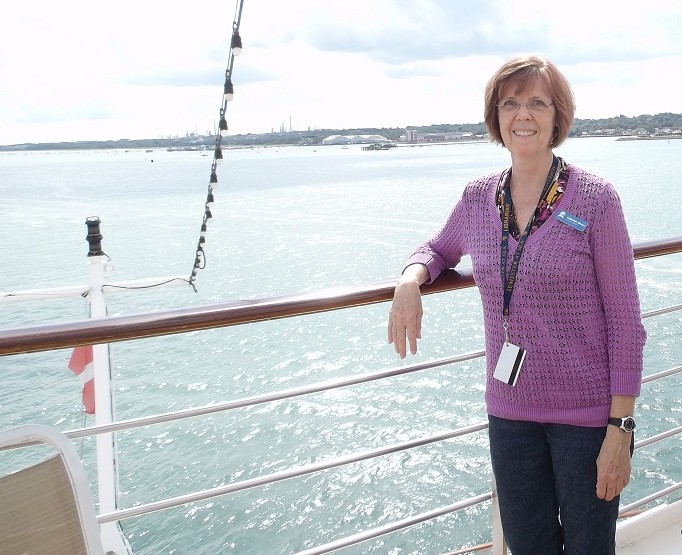
By Catherine Shreve
Catherine Shreve, Duke’s librarian for Public Policy and Political Science, spent last fall literally overseas, working as assistant librarian on a ship for the Semester at Sea program. This floating college visited fourteen Atlantic-border countries—from Russia to Morocco to Brazil and Cuba—while tying the experiences to on-board undergraduate coursework across the disciplines. Before she retires from the Libraries this summer, we asked her to share and reflect on the experience.
In 2014 I went on a self-imposed sabbatical, traveling the Atlantic as the assistant librarian on the ship MV Explorer. The Semester at Sea (SAS) program has been described as a floating college. While sailing the world, undergraduates take a full and varied load of credit courses. As one of my colleagues put it, imagine you are at a small college of about 600 students, and everyone—students, faculty, and staff—lives in the same dorm and eats in the same dining hall. That is the SAS experience. (Not to mention the fascinating field trips we take together.)

Semester at Sea draws students and professors from all over the United States and several other countries. The University of Virginia, SAS’s academic sponsor, provided the dean, registrar, head librarian, and several professors.
The faculty offered courses in a variety of disciplines. Each student was required to take one course that investigated the countries we were visiting through a specific lens such as architecture, biology, commerce, literature, or politics.
Most courses included some focus on the Middle Passage of slaves from Africa to Brazil, since we were scheduled to cross the Atlantic on that route. When our African stops were canceled due to the recent Ebola scare, the ship community rallied to ensure that the content was emphasized in a profoundly moving way. One memorable evening, students, faculty, and staff read from slave narratives in the dim light of the auditorium as the mid-Atlantic ocean rocked our ship.

The head librarian and I supported the coursework from the ship’s library. It was centrally located in an open space, so people often met there to research, study, or just chat. The Reference Desk was an inviting curved glass surface with swivel stools, which had formerly been a bar when the MV Explorer was a cruise ship!
While UVA provided access to databases of journal articles, the complexities of internet access at sea meant that searching and downloading were time-consuming. We learned to be flexible and creative. Working without our accustomed level of electronic connectivity, we rediscovered the joy of browsing print books to identify relevant chapters.
There were other surprising twists that came with ship’s library work, such as balancing ourselves and the books on stormy days. The last-minute request from UVA to weed 20 percent of the collection in preparation for a smaller ship this summer took some scrambling. The rush to check out travel guides before we arrived in each port became a social event and my favorite novel part of the job.

It was in the ports that the best learning took place, through firsthand contact with the people, cultures, and governments of other countries. Classes visited concentration camps, memorials, embassies, universities, the International Court of Justice, NATO, and the UN. Students experienced other cultures with new eyes, hearts, and minds, while assimilating the shipboard discussions and pre-port presentations. For those who had never traveled extensively, it was an opportunity for personal growth. They learned to be adaptable, coping with confusion, frustration, and homesickness while communicating with people in different languages and cultures.
I kept a blog to document my own eye-opening experiences. I saw beautiful buildings and works of art and heard horrific stories of how incomprehensibly inhuman people can be. I visited a Russian family at their dacha, where one woman quietly told me, “Look, I don’t agree with what Putin’s doing, but what can I do?” I saw a Moroccan women’s co-operative in action; participated in a Brazilian candomble (indigenous religious) ceremony; spoke to Cubans on the street and toured a public library in Havana; and everywhere found graffiti and other portrayals of historical and current politics.
This story is difficult to tell without using clichés like “amazing” and “once-in-a-lifetime.” The Semester at Sea community bonded strongly over our experiences in three-and-a-half months of working, living, and exploring together. We all have new lifelong friends and travel partners, and are on the lookout for the next magnificent opportunity to learn the world.


